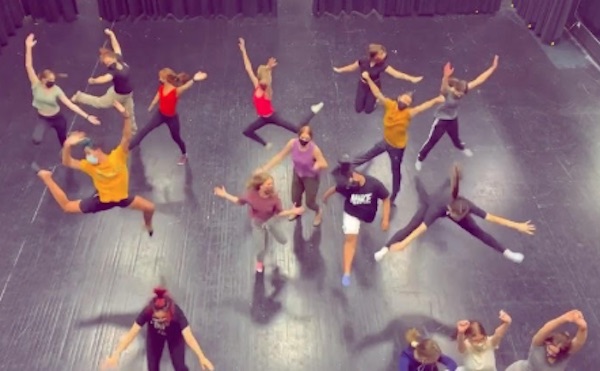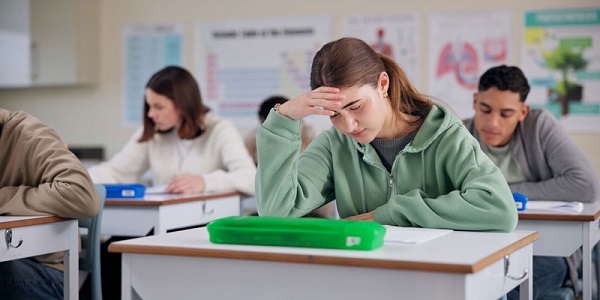Education
Lindsay Thurber Comprehensive High School presents Legally Blonde The Musical

Elle Woods is making her debut in Red Deer as Lindsay Thurber Comprehensive High School presents Legally Blonde The Musical.
Shows run March 12-13 and March 16-17 at Red Deer Polytechnic.
“The aim is to offer students a new style, genre or era of musical theatre each year, so that by the time they graduate they have experienced a variety of styles. Last year, we worked on Annie, so this year, Legally Blonde came from wanting to do something a little more contemporary. It’s got a pop-rock score and some more challenging content, which the high school students were excited for,” said Tara Koett, Teacher at Lindsay Thurber Comprehensive High School. “The show is based on the film, which is based on a book.”
According to Lindsay Thurber’s website Legally Blonde The Musical is, “A fabulously fun award-winning musical based on the adored movie, Legally Blonde The Musical, follows the transformation of Elle Woods as she tackles stereotypes and scandal in pursuit of her dreams. Action-packed and exploding with memorable songs and dynamic dances – this musical is so much fun, it should be illegal!”
“It’s really campy and self aware, ridiculous and clever. For those familiar with the movie, it’s quite similar and maybe a little cheekier,” said Koett. “It’s been a lot of fun, it’s very high energy, and it has a really beautiful and empowering message.”
About 70 students (and two canine actors) are involved in the production, which includes the cast, pit band, and technical theatre students. Koett added the students are giving their all.
“It’s been a really steep learning curve given the fact that in the past two years, their learning has been interrupted because of the pandemic,” she said. “It’s daunting and so exciting to see them start to revisit the skills they haven’t had the chance to use. It’s also the first time in two years that we’ve been able to have our cast and the pit band performing together. It’s really exciting and the energy is palpable.”
Koett said she encourages people to purchase tickets, even if they don’t have a connection to the school community.

“If you love live theatre and you love to laugh – the breadth and depth of work that these students have accomplished is incredible,” she said. “Our pit band is playing the same score that a Broadway Pit Orchestra would play; they are working so hard. The cast and technicians are also working so hard – I am amazed every day. The quality of their work is exceptional.”
Tickets are on sale now. To purchase tickets, visit the Red Deer Polytechnic ticket website, or https://www.rdpsd.ab.ca/
Red Deer
Judge upholds sanctions against Red Deer Catholic school trustee who opposed LGBT agenda

From LifeSiteNews
Monique LaGrange was ousted last December from the Red Deer Catholic Regional Schools’ board for comparing the LGBT agenda targeting children to brainwashing.
A Canadian judge ruled that a school board was justified to place harsh sanctions on a Catholic school trustee forced out of her position because she opposed extreme gender ideology and refused to undergo LGBT “sensitivity” training.
Justice Cheryl Arcand-Kootenay of the Court of King’s Bench of Alberta ruled Thursday that the Red Deer Catholic Regional Schools (RDCRS) Board’s sanctions placed against former trustee Monique LaGrange will stand.
LaGrange had vowed to fight the school board in court, and it remains to be seen if she can take any further actions after the decision by Judge Arcand-Kootenay.
The judge ruled that the RDCRS’s policies in place for all trustees, which the board contended were breached, were “logical, thorough, and grounded in the facts that were before the Board at the time of their deliberations.”
As reported by LifeSiteNews, the RDCRS board voted 3-1 last December to disqualify LaGrange after she compared the LGBT agenda targeting kids with that of “brainwashing” Nazi propaganda. As a result of being voted out, LaGrange later resigned from her position.
The former school board trustee initially came under fire in September 2023 when she posted an image showing kids in Nazi Germany waving swastika flags during a parade to social media, with the bottom of the post showing an image of kids waving LGBT “Pride” flags along with the text: “Brainwashing is brainwashing.”
After her post went viral, calls for her to step down grew from leftist Alberta politicians and others. This culminated in her removal as director of the Alberta Catholic School Trustees’ Association (ACSTA).
In September 2023, the RDCRS passed a motion to mandate that LaGrange undergo “LGBTQ+” and holocaust “sensitivity” training for her social media post.
LaGrange, however, refused to apologize for the meme or undergo “sensitivity” training.
She had argued that the RDCRS had no right to issue sanctions against her because they were not based on the Education Act or code of conduct. Arcand-Kootenay did not agree with her, saying code of conduct violations allow for multiple sanctions to be placed against those who violate them.
Education
‘Grade inflation’ gives students false sense of their academic abilities

From the Fraser Institute
The average entrance grade at the University of British Columbia is now 87 per cent, up from 70 per cent only 20 years ago. While this is partly because the supply of available university spots has not kept pace with growing demand, it’s also likely that some B.C. high schools are inflating their students’ grades.
Suppose you’re scheduled for major heart surgery. Shortly before your surgery begins, you check into your surgeon’s background and are pleased to discover your surgeon had a 100 per cent average throughout medical school. But then you learn that every student at the same medical school received 100 per cent in their courses, too. Now you probably don’t feel quite as confident in your surgeon.
This is the ugly reality of “grade inflation” where the achievements of everyone, including the most outstanding students, are thrown into question. Fortunately, grade inflation is (currently) rare in medical schools. But in high schools, it’s a growing problem.
In fact, grade inflation is so prevalent in Ontario high schools that the University of Waterloo’s undergraduate engineering program uses an adjustment factor when evaluating student applications—for example, Waterloo might consider a 95 per cent average from one school the equivalent of an 85 per cent average from another school.
Grade inflation is a problem in other provinces as well. The average entrance grade at the University of British Columbia is now 87 per cent, up from 70 per cent only 20 years ago. While this is partly because the supply of available university spots has not kept pace with growing demand, it’s also likely that some B.C. high schools are inflating their students’ grades.
Sadly, grade inflation is so rampant these days that some school administrators don’t even try to hide it. For example, earlier this year all students at St. Maximilian Kolbe Catholic High School in Aurora, Ontario, received perfect marks on their midterm exams in two biology courses and one business course—not because these students had mastered these subjects but because the York Catholic District School Board had been unable to find a permanent teacher at this school.
The fact that a school board would use grade inflation to compensate for inadequate instruction in high school tells us everything we need to know about the abysmal academic standards in many schools across Canada.
And make no mistake, student academic performance is declining. According to results from the Programme for International Assessment (PISA), math scores across Canada declined from 532 points in 2003 to 497 points in 2022 (PISA equates 20 points to one grade level). In other words, Canadian students are nearly two years behind on their math skills then they were 20 years ago. While their high school marks are going up, their actual performance is going down.
And that’s the rub—far from correcting a problem, grade inflation makes the problem much worse. Students with inflated grades get a false sense of their academic abilities—then experience a rude shock when they discover they aren’t prepared for post-secondary education. (According to research by economists Ross Finnie and Felice Martinello, students with the highest high school averages usually experience the largest drop in grades in university). Consequently, many end up dropping out.
Grade inflation even hurts students who go on to be academically successful because they suffer the indignity of having their legitimate achievements thrown into doubt by the inflated grades of other students. If we want marks to have meaning, we must end the practise of grade inflation. We do our students no favours when we give them marks they don’t really deserve.
Just as our confidence in a surgeon would go down if we found out that every student from the same medical school had a 100 per cent average, so we should also question the value of diplomas from high schools where grade inflation is rampant.
Author:
-

 Business1 day ago
Business1 day agoCarbon tax bureaucracy costs taxpayers $800 million
-

 Brownstone Institute1 day ago
Brownstone Institute1 day agoThe Most Devastating Report So Far
-

 ESG19 hours ago
ESG19 hours agoCan’t afford Rent? Groceries for your kids? Trudeau says suck it up and pay the tax!
-

 Daily Caller19 hours ago
Daily Caller19 hours agoLos Angeles Passes ‘Sanctuary City’ Ordinance In Wake Of Trump’s Deportation Plan
-

 John Stossel17 hours ago
John Stossel17 hours agoGreen Energy Needs Minerals, Yet America Blocks New Mines
-

 COVID-191 day ago
COVID-191 day agoDr. McCullough praises RFK Jr., urges him to pull COVID shots from the market
-

 Business2 days ago
Business2 days agoOttawa’s avalanche of spending hasn’t helped First Nations
-

 MAiD1 day ago
MAiD1 day agoOver 40% of people euthanized in Ontario lived in poorest parts of the province: government data







